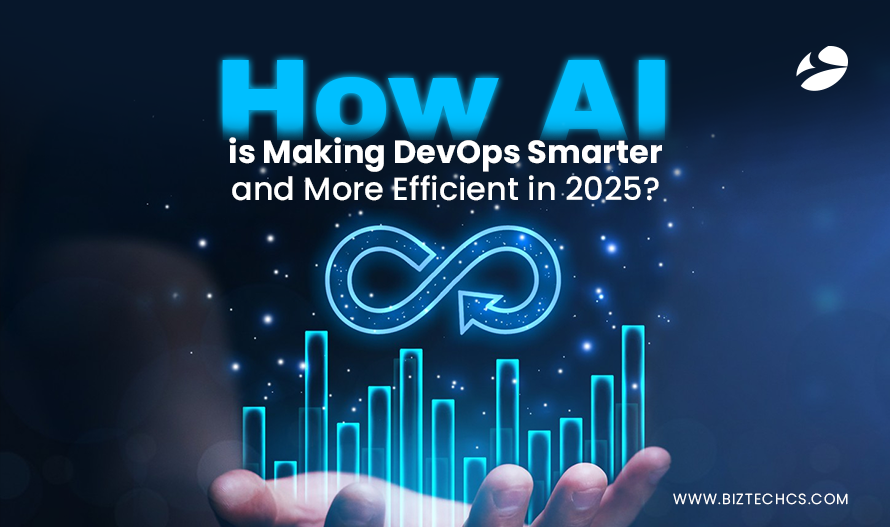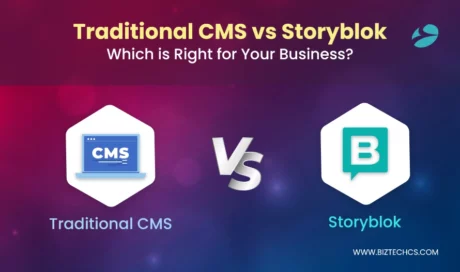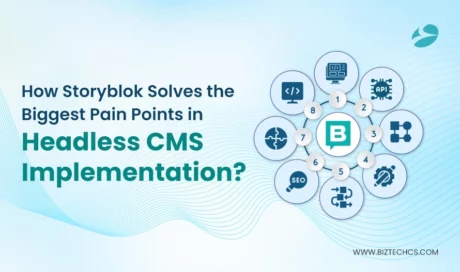How AI is Making DevOps Smarter and More Efficient in 2025?
17 Feb, 2025
10 min read
17 Feb, 2025
10 min read
Table Of Content

What if your DevOps pipeline could predict problems, identify them before they become problems, and optimize itself without human assistance? This is precisely what DevOps with AI is accomplishing in 2025—converting conventional automation into intelligent automation.
AI development solutions actively improve performance, security, decision-making, and optimizing workflows. With advanced DevOps services, teams are decreasing downtime, speeding up deployments, and removing bottlenecks through more intelligent DevOps implementation.
In DevOps, AI is changing the emphasis from solving issues to averting them completely. We’ll look at how AI transforms DevOps in this blog, making it faster, smarter, and more effective than ever before.
By automating processes and predicting system problems, AI in DevOps can increase productivity. Predictive analytics aids in performance bottleneck detection, capacity planning optimization, and failure forecasting.
With AI-driven test generation, self-healing scripts, and real-time anomaly detection, automated testing guarantees stable releases. AI models that identify problems carry out root cause investigations, and automate remedies enhance incident management.
Automated compliance audits, anomaly monitoring, and AI-based threat identification benefit security and compliance.
To improve software delivery, CI/CD pipeline optimization uses AI-driven code analysis, failure prediction, and deployment automation. AI-powered cost forecasting, resource optimization, and auto-scaling improve infrastructure management efficiency.
For precise forecasts and automation, AI development solutions require high-quality data. Examples of data sources are application logs, CI/CD pipelines, Prometheus and Datadog monitoring tools, and infrastructure metrics like CPU and memory consumption.
Teams can use tools like ELK Stack, Splunk AI, and Dynatrace AI to get insights from logs when implementing AI in DevOps. In order to improve DevOps deployment, these technologies aid in the processing of raw data and the identification of patterns.
The training of AI models for failure detection also heavily relies on incident response reports. By examining past data, AI-driven systems are guaranteed to be able to anticipate and avoid problems accurately.
Continuous integration (CI) is enhanced by AI-driven automation, which uses AI-based code review tools such as DeepCode and Codacy to find vulnerabilities. With Diffblue Cover, AI in DevOps can create test cases, decreasing manual labor and boosting test coverage.
AI assists in automating release decisions for continuous deployment (CD) by using historical deployment success rates. Moogsoft and IBM Watson AIOps are two tools that identify deployment irregularities and guarantee seamless rollouts.
Self-healing systems with PagerDuty AI Ops and anomaly detection with models like Facebook’s Prophet are made possible by AI-powered monitoring and incident response. By automating incident resolution, chatbots like Microsoft Copilot minimize downtime.
Numerous AI-powered technologies improve the application of DevOps in several domains. AI plugins for Jenkins, Harness AI, and GitHub Copilot help with CI/CD optimization by providing automatic recommendations and rollbacks.
AI-driven monitoring analyzes system performance and identifies malfunctions using tools like Datadog AI, Dynatrace AI, and New Relic AI.
With the help of Moogsoft AIOps, PagerDuty AI Ops, and BigPanda, which correlate events to identify underlying causes, AI-powered incident management speeds up response times.
AI is used by security and compliance solutions like Darktrace and AWS GuardDuty to identify cloud vulnerabilities and cybersecurity risks. These AI development tools improve DevOps security and expedite processes.
NLP approaches for log analysis, machine learning models, and data processing are necessary to develop DevOps AI. While TensorFlow and Scikit-learn create models for anomaly identification, tools like Pandas and Apache Spark aid in efficiently processing logs.
Logs are analyzed, patterns are found, and root cause investigation is automated by NLP-based models such as BERT. AIOps systems can be taught to increase automation using historical event data, system failures, and log trends.
Solutions for AI development should be adjusted to accommodate shifting infrastructural requirements. This method guarantees that AI models continue to manage DevOps activities effectively.
AI-driven ChatOps incorporates AI for automation into communication technologies. Thanks to AI in DevOps, slack bots and Microsoft Copilot can initiate deployments and handle incidents.
Log analysis driven by AI assists in summarizing errors and promptly alerting teams. Using ChatOps to automate deployments enhances teamwork and reduces software release delays.
AI-driven notifications speed up incident resolution by providing real-time system health information. By minimizing manual involvement, these connectors streamline the deployment of DevOps.
For AI models to be useful in DevOps, they require constant observation and retraining. Models should be updated with fresh DevOps data to guarantee automation and forecast accuracy.
Feedback loops decrease false alarms and enhance decision-making through reinforcement learning. Reliability in AI development solutions requires monitoring of AI bias and drift. AI-driven DevOps procedures are optimized with regular performance checks.
Long-term success and efficiency in DevOps implementation are improved by a well-managed AI system.
Log analysis, CI/CD improvements and infrastructure monitoring are just a few of the repetitive chores AI in DevOps helps automate. This speeds up the development cycle, lowers human mistakes, and reduces manual labor. Teams may concentrate on creativity rather than daily tasks when AI development technologies are integrated into DevOps implementation.
Monitoring solutions with AI capabilities examine records, identify irregularities, and anticipate errors before they occur. This proactive strategy reduces downtime and increases system reliability. DevOps with AI can operate more efficiently by utilizing AI development solutions for automated incident response and root cause analysis.
Predictive analytics is made possible by AI in DevOps to spot performance patterns and maximize system resources. AI models predict resource usage and suggest proactive scaling by examining past data. These AI development solutions improve cost efficiency and ensure smooth DevOps implementation in cloud environments. For businesses relying on SaaS applications, AI-powered DevOps ensures seamless performance optimization, making DevOps for SaaS apps more efficient and scalable.
Real-time vulnerability, suspicious activity, and threat detection are possible with AI-driven security solutions. Automated compliance checks and security policy enforcement decrease the danger of breaches. System security is improved, and regulatory compliance is maintained across the development and deployment pipelines when DevOps uses AI.
By automating CI/CD pipelines, AI in DevOps will decrease manual labor and expedite software releases. AI-powered testing will improve software quality by anticipating and identifying errors before distribution.
AI will automatically fix problems with self-healing systems, decreasing downtime and enhancing dependability. Implementing DevOps will be easier and more effective with these AI development options.
AI tools that can write complex code and improve current codebases, such as Amazon CodeWhisperer and GitHub Copilot, will advance. DevOps AI will help with performance optimization and automatic refactoring, lowering technological debt.
Instead of wasting time on tedious coding duties, these solutions will assist developers in concentrating on creativity. AI-powered DevOps will produce neater, more effective, and more organized code.
AI will manage IT operations through automated problem-solving, anomaly detection, and predictive analytics. AI-powered observability technologies will offer a more in-depth understanding of system security and performance.
Teams using AI in DevOps will be able to identify issues early and stop errors before they affect users. System stability will increase as a result of AIOps’ proactive DevOps implementation.
NoOps environments will result from AI-driven automation, lessening the need for manual infrastructure management. Operations will be managed by intelligent serverless computing, relieving DevOps teams of some of their workload.
AI-powered DevOps will provide self-managing systems that need little human involvement. Due to this change, businesses will be able to concentrate on AI development solutions instead of operational difficulties.
Through real-time threat and vulnerability detection, AI will enhance DevOps security. Safer deployments will be guaranteed by the direct integration of AI-powered security testing tools into CI/CD pipelines.
By using these technologies, DevSecOps will become more proactive and stop security problems before they start. DevOps’ use of AI will improve system security overall while preserving development speed.
AWS CodeGuru offers performance suggestions and automatic reviews to assist enhance the quality of code. To find inefficiencies, possible faults, and areas that require optimization, it makes use of machine learning.
This solution increases the efficiency of DevOps implementation by integrating easily into the development pipeline. Teams may lower technological debt and improve code maintainability by integrating AI into DevOps.
GitHub Copilot is an AI development tool that helps developers by making suggestions for code completions in real-time. It is an AI-powered pair programmer that uses coding context to predict complete functions.
It speeds up coding and lowers errors by supporting various languages and popular IDEs. This increases the speed and precision of development, increasing DevOps’s effectiveness with AI.
Dynatrace uses AI-powered analytics and monitoring to deliver full-stack observability. It facilitates digital experience optimization, automated problem-solving, and anomaly detection in the system.
Teams can proactively manage application and infrastructure performance using its AI-driven insights. This improves DevOps AI, guaranteeing less downtime and more seamless deployments.
For DevOps AI to make good decisions, data must be precise, comprehensive, and pertinent. In DevOps setups, however, data is frequently dispersed among several tools and platforms, which results in inconsistencies.
Outdated or missing data can influence automation and prediction accuracy in AI development solutions. For DevOps to successfully integrate AI, it is essential to guarantee smooth access to high-quality data.
Because DevOps uses various tools for security, monitoring, and CI/CD, integrating AI solutions is challenging. Automation powered by AI must work seamlessly with current DevOps processes.
Further adjustments are needed for many AI development solutions to function with conventional DevOps pipelines. AI in DevOps might lead to inefficiencies rather than process improvement if it is not integrated correctly.
Decisions made by AI in DevOps might be hard to understand, which makes teams hesitant. Teams may oppose using AI if they are unaware of how it generates recommendations. To increase trust in AI-driven automation, transparent AI development solutions are required. Explainability must be guaranteed in DevOps deployment for teams to have faith in AI insights and act accordingly.
Risks, including biased judgments, illegal access, and non-compliance with regulations, are introduced by AI in DevOps. Critical infrastructure may be at risk due to security flaws in AI models.
For AI-driven processes to avoid ethical and legal problems, industry standards must be followed. Strict control and monitoring are required to maintain the security of AI development solutions within DevOps workflows.
AI is revolutionizing DevOps by improving processes’ intelligence, speed, and dependability. By 2025, companies will be using AI in DevOps to automate deployment, security, and monitoring. This expedites software delivery and lowers human error. These days, predictive analytics and AI-driven insights are essential for a successful DevOps deployment.
Biztech helps businesses increase system resilience and streamline processes by integrating AI into DevOps. With expertise in AI-powered automation and AI/ML development services, Biztech guarantees smooth DevOps adoption for companies of all sizes.
AI in DevOps refers to using artificial intelligence and machine learning to automate and improve software development and operations. It helps teams detect issues, optimize workflows, and enhance system reliability.
AI improves DevOps by automating repetitive tasks like code testing, deployment, and monitoring. It also predicts failures, analyzes logs, and suggests fixes, making the development process faster and more efficient.
AI is important in DevOps because it reduces human effort and minimizes errors in software development and operations. It helps teams respond to issues quickly, ensuring smooth and stable system performance.
AI tools like AIOps platforms, machine learning models, and automation tools are useful for DevOps engineers. Popular ones include IBM Watson AIOps, Dynatrace, and GitHub Copilot for coding assistance.
AI can automate many DevOps tasks, but it cannot replace human decision-making and problem-solving. DevOps requires creativity, collaboration, and strategic thinking, which AI cannot fully replicate.

Storyblok
33366
By Devik Gondaliya
02 Apr, 2025

Storyblok
34313
By Devik Gondaliya
01 Apr, 2025

Storyblok
34848
By Devik Gondaliya
27 Mar, 2025